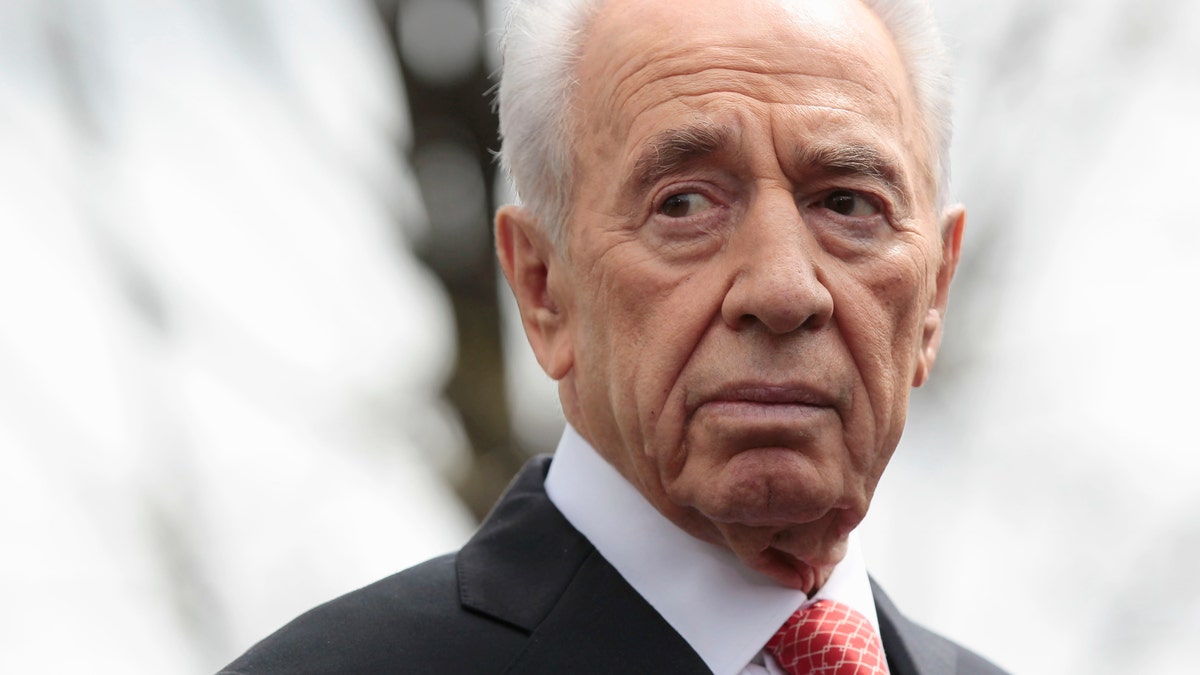
April 5, 2011 - FILE photo of Israeli President Shimon Peres. (AP)
While Israelis and much of the world mourned the death of Shimon Peres, Arab governments and commentators remained largely silent or attacked the former Israeli president and prime minister who called himself their “partner in peace.”
By Wednesday night, not a single Arab leader had announced his intention to join President Obama, Bill and Hillary Clinton, Pope Francis, the U.K.’s Prince Charles and French President Francois Hollande at Peres’ state funeral in Israel on Friday.
Some prominent Arabs and the state-controlled or influenced Arab press went so far as to welcome the death, at age 93, of the man who won the 1994 Nobel Peace Prize for forging peace with the Palestinians. It was Peres who broke an Israeli taboo against talks with the Palestine Liberation Organization and negotiated the Oslo Accord, the plan for Palestinian self-rule in Israeli-occupied Gaza and the West Bank.
“Peres, the butcher of Qana,” read the headline of the Arabic website of Al-Jazeera, which broadcasts from the wealthy Persian Gulf state of Qatar. That was a reference to Israel’s 1996 bombing of a U.N. compound in the southern Lebanese village of Qana, where over 100 civilians who had sought refuge were killed. Peres, who was prime minister at the time, said he had not known there were civilians in the compound.
It was Peres who broke an Israeli taboo against talks with the Palestine Liberation Organization and negotiated the Oslo Accord, the plan for Palestinian self-rule in Israeli-occupied Gaza and the West Bank.
Peres was criticized not only by Palestinian officials who were infuriated by continued Israeli expansion of Jewish settlements on the West Bank, land that both sides claim, but also by prominent voices in other Arab states, including those that have made peace with Israel. Ten hours after the announcement of his death, there was still no official reaction from Egypt or Jordan, both of which have signed peace accords with the Jewish state.
In Egypt, the first Arab state to make peace, AlYoum7, or Seventh Day, a prominent paper with ties to the security services, called Peres "the butcher," and declared, “the killer has died.” Al Masry al-Youm, a popular Egyptian daily, called Peres “the architect of the tripartite aggression on Egypt,” a reference to the 1956 Suez Canal crisis, the failed invasion of Egypt by Britain, France and Israel. The Egyptian website Al-Youm as-Sabi denounced Peres as the “engineer of genocide against Arabs.”
Israel has worked closely, but secretly, with Egyptian President Abdel Fattah el-Sisi’s government to destroy tunnels linking Gaza and Egypt and to combat terrorists aided by Hamas, the militant Islamists who rule Gaza. While Israeli officials say relations between the governments have never been closer, Egyptian governments since Islamic militants assassinated President Anwar el-Sadat in 1982 have relentlessly attacked Israel in popular culture and the media for its suppression of Palestinians and occupation of Arab land. As a result, Egyptians remain deeply hostile to Israelis, who, in turn, have largely boycotted travel there.
While Palestinian President Mahmoud Abbas expressed “sorrow and sadness” at news of Peres’ death, officials in Gaza and other Hamas strongholds denounced him as a war criminal. “The Palestinian people are very happy at the passing of this criminal who caused their blood to shed,” said Hamas spokesman Sami Abu Zuhri. Mustafa Barghouti, a prominent Palestinian politician and activist, accused Peres of using his search for peace to prevent a more just resolution to the Israeli-Palestinian conflict from emerging. Peres, he added, had “created … nuclear power in Israel.”
In Iran, whose radical Shiite government is relentlessly hostile to Israel, candy was distributed on the campus of at least one university to celebrate the occasion.
Shimon Peres was a formidable Arab foe when Israelis were building their state. As defense minister, he helped create Israel’s defense industry; he negotiated major arms deals with Germany and France; and he was a key figure in the development of Israel’s undeclared nuclear arsenal. After the ’67 war, he supported the establishment of Israeli settlements on disputed land.
But once he concluded that the Jewish state was secure, Peres became a relentless, irrepressible champion of peace with Palestinians and Israel’s other Arab neighbors. His secret talks in Oslo in the early 1990s resulted in the first peace accord with Yasir Arafat, then chairman of the Palestine Liberation Organization, Israel’s major foe. Peres also helped convince a skeptical Prime Minister Yitzhak Rabin that the Oslo Accord’s concessions to Palestinians over land and self-rule were in Israel’s strategic interest.
“This is the start of the real peace we have sought for so long,” Peres told me after a ceremony on the White House lawn in September 1993 to mark the Oslo Accord’s signing. Even after Israelis soured on the prospects for peace in the wake of violent uprisings in the West Bank and Gaza — the intifadas — and growing chaos and Islamic militancy throughout the region in the wake of the Arab Spring upheavals, Peres clung to hope for peace.
At a meeting in Kiev two years ago, Peres told me that he was still confident about Israel’s future and an eventual peace with the Arabs. “One day they will see that war and hostility towards Israel have gotten them nothing,” he said. “Arabs want what we all want for our children. We must continue to dream — to focus on the future.”
